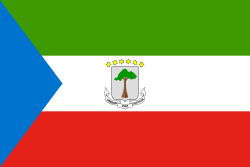| Football in Equatorial Guinea | |
|---|---|
 | |
| Country | Equatorial Guinea |
| Governing body | Equatoguinean Football Federation |
| National team(s) | men's national team |
Club competitions | |
International competitions | |
Champions League CAF Confederation Cup Super Cup FIFA Club World Cup FIFA World Cup(National Team) African Cup of Nations(National Team) | |
Association football (soccer) is the most popular sport in Equatorial Guinea. It was during Spanish colonialism that football arrived to Equatorial Guinea. [1] [2] Football is now a very popular sport in the country. [3] Recently the national team has made a few surprising results. [4] [5] In the qualification for the FIFA World Cup in 2006 Togo (who later qualified for the World Cup) was beaten 1-0, and in qualification for the African Cup of Nations in 2008 they beat Cameroon 1-0.
Contents
Equatorial Guinea co-hosted the 2012 Africa Cup of Nations with Gabon, and was the host of the 2015 Africa Cup of Nations.



